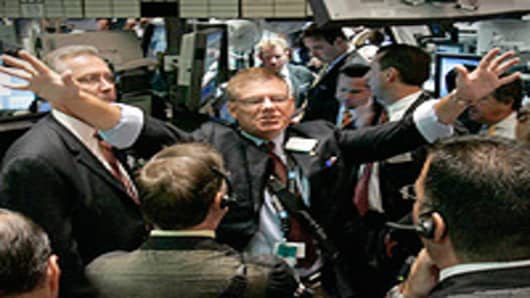"I think the market is on edge and probably will continue to be through next Tuesday," Mike Burnick, director of research at Sovereign Society, told CNBC.com. "The retail sales report today was another nail in the coffin that the economy is slowing, so I think the Fed is pretty much backed into a corner."
Four of the ten S&P 500 sectors traded lower in a light-volume session. The financial, health care and technology sectors came under weakness following consistent gains this week.
The Dow Jones Industrial Average posted a weekly gain of 2.5%, the S&P 500 rose 2.1% and the Nasdaq Composite advanced 1.4%.
The Dow has logged year-to-date gains of 7.9%, while the S&P 500 is up 4.6% and the Nasdaq has gained 7.7% in 2007.
Information technology shares came under pressure after a downgrade for Intel, while financial stocks were pressured by news that England's central bank bailed out one of the UK's largest mortgage lenders. Northern Rockasked the central bank for an emergency rescue loan to keep it afloat, sending shares plummeting.
"The initial reaction was concern over Northern Rock in the UK, but the overall market is showing some resiliency," said Robert Pavlik, chief investment officer at Oaktree Asset Management. "It's a quiet day and there's still hope the Fed will cut interest rates. It's going to be all about the Fed meeting and there will probably be some cautiousness leading up to the meeting.
Retail sales rose 0.3% in August, lower than the 0.5% increase economists were expecting, according to a Dow Jones survey. Ex-autos, retail sales fell 0.4%, much lower than the 0.2% increase economists were looking for and the biggest decline in almost a year.
"There's been some concern with $80 oil and the housing crisis that the consumer will slack back," said Arthur Cashin, UBS director of floor operations. "This is a small hint of that, so this is also adding to the pressure."
The University of Michigan's preliminary consumer sentiment index rose to 83.8, slightly better than the 83.4 economists were expecting, according to Reuters. The Commerce Department also said inventories at U.S. businesses tightened in July ahead of the August financial crunch.
Market players predict a Fed funds rate cut of between a quarter-point and a full point to ease the distress in the money markets. Fed data showed that last week banks borrowed $7.2 billion from the Fed's discount window, the largest amount since the Sept. 11 terrorist attacks.


